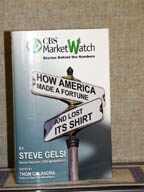Whether it was boom or bust, the stock market has produced many intriguing tales from everyday investors in the past decade. Some of these stories have been captured and recorded in How America Made A Fortune and lost Its Shirt, a new book by Jersey City resident Steve Gelsi.
Traveling around America to meet self-proclaimed lone investment gurus, community-based investment groups, and ambitious teenagers, Gelsi, a senior reporter at CBS MarketWatch, has revealed the everyman investor that the media fell in love with during the 1990s bull market.
Unlike the Wall Street savvy traders wheeling and dealing on the floor of the stock exchange, the general public, encouraged by new technology, stepped up to the plate to take a swing at the marketplace.
In the book, Gelsi covers the everyday people who entered the stock market in the 1990s and developed their own methods of forecasting how certain stocks might do.
In Richmond, Va., Gelsi interviewed an investment group of a few African-American friends who had very little knowledge about the Stock Exchange when they began. Known as Investment 2000, the group “touted conservative fiscal management, taking the time to invest on your own, and using money and knowledge to help the community and teach kids,” according to Gelsi. With monthly dues, required presentations, and a regular updated analysis, Investment 2000 enabled a middle-class African-American community to tap into an investment tradition formerly exclusive to the nation’s elite.
Other stories describe the adventures of cowboy investors, like Tokyo Joe, who bought and sold stocks with every breath he took. Using chat rooms to bolster a stock’s image, he learned how to manipulate the Internet’s resources for his own gain. When asked if his stock market practices were ethical, he dressed himself as a modern era Robin Hood who played the game the same way as the behemoth investment firms, but with a tiny fraction of the resources.
In an interview with the Reporter, Gelsi said that the idea came from a CBS MarketWatch contest that pitted individual investors against one another in a similar fashion to the hit reality television series Survivor.
Originally planned to profile those contestants, the book took a different direction when Gelsi expanded the vision of the book to profile the different types of investors the boom market brought to the table.
The market now
With the boom era shrouded in a foggy past, Gelsi said that the new marketplace has calmed down, but remains a new home for investors outside the market.
“People have been burned and they learned their lesson,” Gelsi said. “Other people left the arena entirely.”
He said that the Internet continues to be an important technology for the new market place as it lures investors who were not there before.
“The Internet is an incredible tool for the stock market, but it could very much also lead to your undoing,” Gelsi said.
Looking ahead, Gelsi said that the market is riddled with post-boom horror stories like the accounting scandals, terrorism, and shrinking markets. “A lot of it is political, or linked to the war on terrorism,” Gelsi said. “People don’t know when the next explosion is going to happen.”
However, he anticipates that the market should react as it has in the past by incorporating these factors into the equation. “People are going to learn to live with terrorism,” Gelsi said. “The market historically swings from one extreme to the other. It’s greed and fear driving everything, and those are volatile things.”
Small towns to big markets
Gelsi began his journalism career as a community reporter for several different newspapers. In 1995, he made a leap into business journalism when he took a job with the Adweek Magazine Group, where he started to write company profiles and concentrate on the nuts and bolts of business models and their results in the world of advertising. Sticking to this niche, Gelsi joined the East Coast division of CBS MarketWatch in 1998, an online financial news center to compete with web sites like Bloomberg.com.
How America Made A Fortune and Lost Its Shirt is Gelsi’s first book. “It’s exciting,” he said. “It gives me confidence for other writing projects I have that are completely unrelated to Wall Street.”
